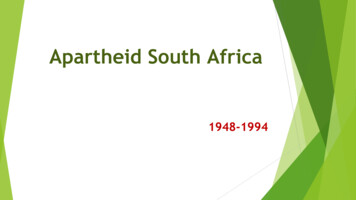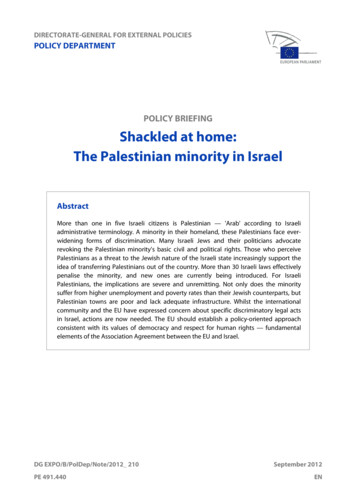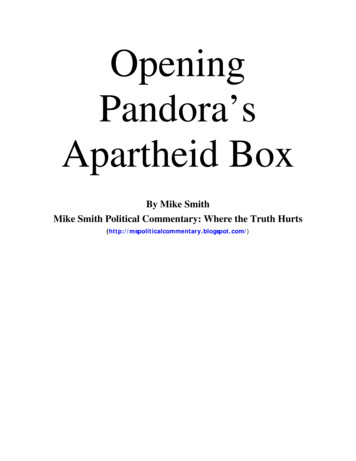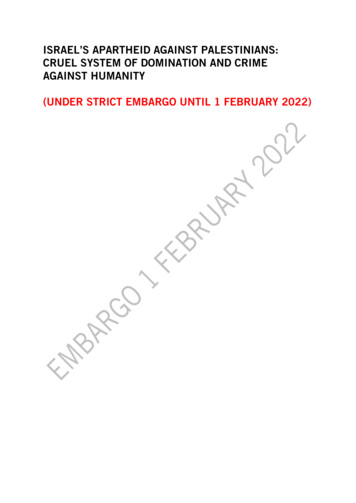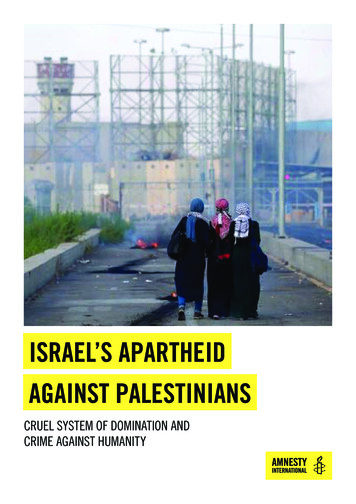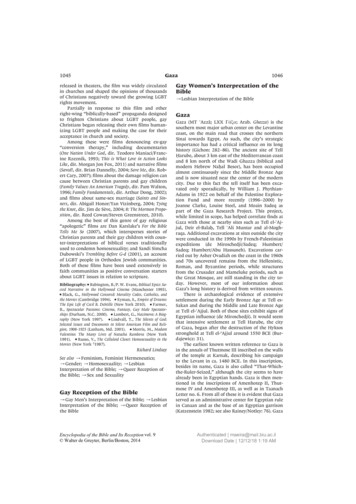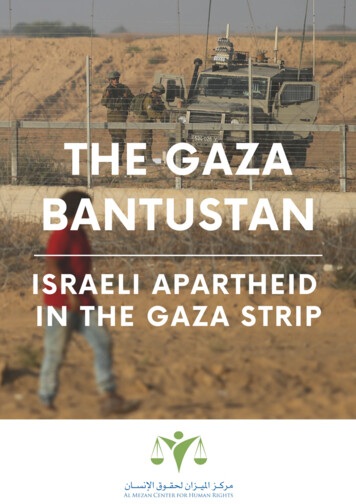
Transcription
The Gaza Bantustan—Israeli Apartheid in the Gaza Strip1
The Gaza Bantustan—Israeli Apartheid in the Gaza StripAl Mezan Center for Human Rights is an independent, non-partisan and non-governmentalhuman rights organization established in 1999. Al Mezan is dedicated to protecting andadvancing the respect of human rights, with a focus on economic, social, and cultural rights,supporting victims of violations of international law through legal initiatives, and enhancingdemocracy, community and citizen participation, and respect for the rule of law in Gaza aspart of occupied Palestine.Main office:5/102-1 Al Mena, Omar El-Mukhtar StreetWestern RimalGaza City, Gaza Strip (occupied Palestine)P.O. Box 5270Telfax: 970 (0)8 282-0442/7Jabalia office:Al Eilah Building (1st Floor), Al Trans SquareJabalia Camp, Gaza Strip (occupied Palestine)P.O. Box: 2714Telfax: 970 (0)8 248-4555/4Rafah office:Qishta Building (1st Floor), Othman Bin Affan StreetRafah, Gaza Strip (occupied Palestine)Telfax: 970 (0)8 213-7120Email: info@mezan.orgWebsite: www.mezan.org/en 2021 AL MEZAN CENTER FOR HUMAN RIGHTSALL RIGHTS RESERVEDCover photo: Palestinian protesters and Israeli troops at the Great March of Return, Khan Younis,southern Gaza Strip, 13 July 2018. Photo by Ashraf Amra/APA 0
The Gaza Bantustan—Israeli Apartheid in the Gaza StripTABLE OF CONTENTSEXECUTIVE SUMMARYi-ivMAPv1.Introduction12.Apartheid, Palestine, and International Law62.1 The Crime of Apartheid Under International Law62.2 Applicable International Legal Framework and Israel’s Effective Control of the Gaza Strip82.3 Palestinians and Israeli Jews as Racial Groups123Israel’s Systemic Oppression, Segregation, and Fragmentation to Assert Domination144.Israel’s Crime of Apartheid as Perpetrated Against Palestinians in the Gaza Strip184.1 An Open-Air Prison: Closure, Isolation, Collective Punishment, and Domination in Violation ofApartheid Convention184.2 By Denial to Palestinians in Gaza of the Rights to Life and Liberty234.2.1Recurrent targeting of civilians in the access restricted areas244.2.2Great March of Return254.2.3Four military offensives in 13 years264.3 By Arbitrary Arrest and Illegal Imprisonment of Palestinians in Gaza, By The Infliction Upon Themof Serious Bodily or Mental Harm, By The Infringement of Their Freedom or Dignity, or By SubjectingThem To Torture or To Cruel, Inhuman or Degrading Treatment or Punishment294.3.1Arbitrary Arrests in the Access Restricted Areas294.3.2Arbitrary Arrest of Medical Patients and Their Carers304.4 Deliberate Imposition on Palestinians in Gaza of Living Conditions Calculated to Cause TheirPhysical Destruction in Whole or in Part4.4.1532Israel’s control of Electricity and Energy, Water, and Sanitation32Energy and Electricity32Water and Sanitation344.4.2Health384.4.3Destruction of Homes and Right to Family Life414.3.4Economic Domination and Control Over Food Supply44Conclusions and Recommendations485.1 Israel’s Discriminatory Legal System Prevents Challenge to Apartheid Regime485.2 State Responsibility Under International Law525.3 The International Criminal Court545.4 Recommendations55i
The Gaza Bantustan—Israeli Apartheid in the Gaza StripEXECUTIVE SUMMARYPursuant to its mandate to promote the respect, protection, and fulfillment of internationallaw in the Gaza Strip as part of the occupied Palestinian territory (OPT), Al Mezan Center forHuman Rights (Al Mezan) presents this report, titled ‘The Gaza Bantustan—Israeli Apartheidin the Gaza Strip’, which analyzes the crime of apartheid in relation to Israel’s conduct towardsGaza, within the context of the State’s protracted occupation of the OPT and Zionist settlercolonialism in historic Palestine. The report considers how Israeli apartheid, experienced by allPalestinian people, is specifically visited upon the two million Palestinians living in the GazaStrip.While the Israeli government purports to justify the closure and related restrictions under theguise of “security”, this report will show how these policies demonstrate Israel’s intent toseparate and divide Palestinians and re-engineer the demographics of the entire Palestinianpopulation in order to assert its domination over them. As a sealed-off enclave, fragmentedfrom the rest of the OPT and controlled by Israel within its apartheid system, Gaza is a stripof land that can be likened to a South African bantustan. Some interlocutors, as will bediscussed in this report, have suggested that the comparison is in fact inexact because theGaza Strip is substantially worse than the South African bantustans ever were.The report considers the following violations of international law through the prism of theApartheid Convention: use of excessive force and recurrent military targeting of civilians andcivilian homes, killing thousands; arbitrary arrest and detention of children, patients,fishermen, and other vulnerable groups; and the sustained closure and blockade. Al Mezanconcludes that these practices amount to “inhuman acts” as defined by the ApartheidConvention, including murder, infliction of mental and bodily harm, arbitrary arrest and illegalimprisonment, imposition of living conditions calculated to cause the physical destruction ofthe population in whole or in part, and the denial of the right to freedom of movement andto leave and return. These inhuman acts are perpetrated by the State of Israel for the purposeof establishing and maintaining domination by one racial group—Israeli Jews—againstanother racial group—Palestinians.Israel’s 14-year closure and blockade, combined with a range of punitive measures andpolicies, allows it to maintain effective control over the Gaza Strip, which serves the purposeof consolidating its domination over the Palestinian people as a whole. This report will brieflyreaffirm the occupied status of the Gaza Strip together with the legal guarantees stemmingfrom that status which is afforded to the population of the Gaza Strip as a protectedpopulation, including in relation to protection against racial discrimination, apartheid, andpersecution.This report is issued in the context of an evolving recognition that successive Israeligovernments are continuing to commit the crime of apartheid as defined by the UN Apartheidi
The Gaza Bantustan—Israeli Apartheid in the Gaza StripConvention and the Rome Statute of the International Criminal Court. Based on the analysispresented, which is drawn from and develops existing relevant work by Palestinian, Israeli,and international human rights organizations, academics, and experts, this report concludesby reaffirming that Israel’s institutionalized and systemic racial domination and oppression ofthe Palestinian people, including those residing in the Gaza Strip, contravenes Article 3 of theInternational Convention on the Elimination of All Forms of Racial Discrimination, amounts tothe crime of apartheid per the Apartheid Convention, and constitutes a crime againsthumanity under the Rome Statute of the International Criminal Court.In accordance with the relevant applicable instruments of international law, namelyinternational human rights and humanitarian law, and relevant obligations of states, the reportprovides a set of recommendations for the international community, to the InternationalCriminal Court, and to corporate actors:The international community and Member States of the United Nations:1. Recognize and condemn Israel’s regime of institutional discrimination, oppression,and apartheid against the Palestinian people—including Palestinian citizens of Israel,Palestinians in the OPT, and Palestinian refugees in exile;2. Ensure that Israel withdraws and dismantles its apartheid regime and repeals alllegislation, laws, and policies that result in its institutional discrimination andsystemic oppression of the Palestinian people and that are instrumental inmaintaining a dominant Jewish Israeli composition in historic Palestine;3. Ensure that Israel fulfills and facilitates Palestinian refugees’ right to return to theirhomes, and property, including the refugees making up 70% of the Gaza Strip’spopulation, as guaranteed under international law;4. Ensure that Israel lifts its illegal closure and blockade imposed on the Gaza Stripimmediately, fully, and unconditionally, and ends all associated unlawfulrestrictions imposed on the movement of people and goods to and from the GazaStrip;5. Ensure that Israel ends its occupation, dismantles its settlement enterprise in theWest Bank, including East Jerusalem, and abolishes all military and discriminatorytools from the OPT, including the Separation Wall and other physical barriers thathave disrupted its territorial contiguity and resulted in the fragmentation andisolation of Palestinians;6. Ensure accountability and justice for widespread, gross, and systemic violationsagainst the Palestinian people, including for the crime of apartheid;ii
The Gaza Bantustan—Israeli Apartheid in the Gaza Strip7. Support the independence of the International Criminal Court and protect theCourt against attacks or political pressure as it conducts its investigation into theSituation in Palestine, encompassing the crime of apartheid against the Palestinianpeople;8. Provide political and financial support for the mandate of the UN IndependentInternational Commission of Inquiry on the Occupied Palestinian Territory,including East Jerusalem, and Israel, established in May 2021, and call on theCommission to investigate Israel’s apartheid and make recommendations in lightof relevant obligations and responsibilities of states, international organizations,and business enterprises;9. Allow for and facilitate the activation of universal jurisdiction mechanisms toprosecute the alleged perpetrators of Israel’s crime of apartheid and its associatedviolations;10. Reaffirm the commitment of the United Nations to the total eradication ofapartheid as a crime that is inconsistent with the principles contained in the Charter ofthe United Nations, and that renders Israel in breach of its obligations as a Member ofthe United Nations;11. Ratify and accede to the Apartheid Convention, especially states that have jurisdictionover private actors, including transnational corporations, charities, associations, andindividuals operating in and linked to Israeli state institutions and the military;12. Request the UN General Assembly to re-establish the UN Special Committeeagainst Apartheid and the UN Centre against Apartheid to advocate for an end toIsraeli apartheid;13. Consider imposing individual sanctions, such as travel bans or assets freezes, onsuspected perpetrators of internationally recognized crimes and grave breaches,as recommended in 2019 by the UN Commission of Inquiry on the Great March ofReturn, including for the crime of apartheid; condition arms sales and military andsecurity assistance on Israel’s compliance with international law and human rightsnorms; and review and amend or end the agreements, cooperation schemes andtrade with Israel in which the funding or activities are found to facilitate the crimeof apartheid, in line with international legal standards and based on legal necessity;14. Expand the mandate of the UN Special Rapporteur on the situation of human rightsin the Palestinian Territory occupied since 1967 to cover the Palestinian people asa whole, on both sides of the Green Line and as refugees and exiles abroad tocounter Israel’s strategic fragmentation of the Palestinian people;iii
The Gaza Bantustan—Israeli Apartheid in the Gaza Strip15. Call on the UN Special Rapporteur on the situation of human rights in thePalestinian Territory occupied since 1967 to report annually to the Human RightsCouncil and the Third Committee of the General Assembly on steps taken by Israeland the international community to comply with the terms of the 1973 ApartheidConvention in Palestine;16. Ensure that businesses with relationships and activities linked to Israel and the OPTfully align with international law and are not involved or complicit in graveviolations and international crimes, including that of apartheid. Where necessary,exclude businesses from public procurement bidding where they are unable orunwilling to respect international law within this context, in line with the UNGuiding Principles and the principles of non-recognition and non-assistance;17. Pressure Israel to end, including through associated actors and organizations, itsdeliberate attacks and campaign of intimidation, smears, delegitimization, andharassment of Palestinian, Israeli, and international human rights defenders andcivil society organizations; urge Israel to rescind its “terror” designation oflegitimate Palestinian human rights groups; and assert support of these groupsthrough public statements and continued cooperation, engagement, and funding.The International Criminal Court:18. Conduct a prompt, thorough, and comprehensive investigation of the crimes ofapartheid and persecution, and other associated crimes that fall within thejurisdiction of the Court with respect to the Situation in Palestine, and accordinglyprosecute relevant perpetrators;19. Investigate the role of non-state actors in the commission of the crime of apartheid,among other crimes, in the Situation in Palestine, including private business actors,charity organizations representatives, and others.Corporate Actors:20. Cease all activities and relationships that are directly or indirectly linked to Israel’smilitary occupation, colonization and apartheid regime, and associated violationsof international law;21. Conduct ongoing and enhanced human rights due diligence, in compliance withinternational human rights and humanitarian law and the UN Guiding Principles onBusiness and Human Rights, to avoid complicity and involvement in Israeliperpetrated violations and international crimes against the Palestinian people.iv
The Gaza Bantustan—Israeli Apartheid in the Gaza StripMAPv
The Gaza Bantustan—Israeli Apartheid in the Gaza Strip1. INTRODUCTIONIn the context of the growing international recognition that successive Israeli governmentshave committed the crime of apartheid against the Palestinian people, Al Mezan Center forHuman Rights, which has been documenting human rights abuses on the ground in Gaza formore than two decades, now focuses on the specific case of apartheid as visited upon thePalestinian population of the Gaza Strip—two million people who live in an open-air prison,crippled by a 14-year closure and subject to periodic barbarous military onslaughts and dailyviolations of their basic, fundamental rights.Israel’s illegal land, sea, and air closure of Gaza encloses the inhabitants in an isolated enclavein which they are denied fundamental freedoms and in which they are trapped in a state ofprotracted humanitarian catastrophe. The Gaza Strip has long been deemed uninhabitable,and in 2021 it is certainly unfit for dignified human life. Two million Palestinian people areimprisoned in what is tantamount to a bantustan—a term that was applied to former territoriesdesignated by the white-dominated apartheid regime of South Africa as quasi autonomoushomelands to settle majority black Africans.This report will discuss how Israel’s policies in relation to the Gaza Strip, implemented underthe guise of “security”, demonstrate its intent to separate and divide Palestinians in order tosystematically assert Israeli domination over them. This policy is pursued in furtherance ofIsrael’s over-arching goal to target and dominate all Palestinians in their ever-morefragmented physical locations—on both sides of the Green Line,1 in occupied Jerusalem, theWest Bank, the Gaza Strip, and in exile—ensuring Israeli-Jewish privilege and prominence inall of historic Palestine. The plight of the Palestinian people has in recent years beenrecognized as a situation of apartheid.From the beginning of the twentieth century, Zionist colonialist ideology began laying thegroundwork for the system of discrimination and racial domination of the Palestinian peoplethat would later be formalized through the State of Israel. Since the founding of the State in1948, the Palestinian people have endured an ongoing nakba through means of ethniccleansing, forced displacement, dispossession, population transfer, and political, legal, andgeographic fragmentation, as part of Israel’s attempt to oppress and eradicate them fromtheir land and homes. In deference to the colonial vision of establishing a home for the Jewishpeople in Palestine, the Palestinian people have been constantly dispossessed and deniedtheir collective, inalienable right to self-determination.Israel’s military occupation of the OPT, comprising the West Bank, including East Jerusalem,and the Gaza Strip, since 1967, has served the settler-State’s plan to expand territorially—akey pillar to advancing Jewish domination in Palestine.2 The illegal and prolonged military12The Green Line is the 1949 Armistice Line, which is internationally accepted as the boundary between Israel and the OPT.Fayez Sayegh, ‘Zionist Colonialism in Palestine (1965)’, 2(1) Settler Colonial Studies (2013), pp. 206-225.1
The Gaza Bantustan—Israeli Apartheid in the Gaza Stripoccupation is characterized by serious breaches of international law;3 in the case of Gaza thishas latterly included the comprehensive closure and blockade policy. Across the OPT, theIsraeli authorities confiscate and destroy property, pillage natural resources, and annex land(including the formal annexation of East Jerusalem and de facto annexation of parts of theWest Bank).At present, Israel effectively controls the lives of approximately seven million Jewish Israelisand seven million Palestinians in Israel and in the OPT combined. In order to satisfy its goalsof racial supremacy and to annex territory,4 the State of Israeli relies on a framework of lawsand military orders allowing it to pursue a wide range of discriminatory policies againstPalestinians. Palestinian people are oppressed and segregated across various territorial andlegal domains and are subjected to an array of daily and systematic abuses of their rights.One such cardinal policy denies the right of return to Palestinian refugees, displaced persons,and exiles, in order to establish and maintain a Jewish majority and to further bolster Israel’sself-proclaimed status as the Jewish State.The word “apartheid”—originating from Afrikaans and meaning “separateness”—refers to apolicy or system of segregation or discrimination based on grounds of race. While coined andemployed in the context of the South African regime of institutionalized racist segregationand discrimination against indigenous Black South Africans and other racialized groups, theterm can be,5 and has been6 applied in other contexts. Under international law, apartheidfeatures as a crime against humanity under both the 1973 International Convention on theSuppression and Punishment of the Crime of Apartheid (the Apartheid Convention) and the1998 Rome Statute of the International Criminal Court (the Rome Statute).Palestinian NGOs, in collaboration with regional and international actors, have longemphasized Israel’s oppression, institutionalized discrimination, and fragmentation of thePalestinian people. These organizations have highlighted a series of violations of internationallaw, including of the rights to life, dignity, development, to liberty and freedom of movement,and to be free from torture or cruel, inhuman, or degrading treatment or punishment, among3Report of the Special Rapporteur on the situation of human rights in the Palestinian territories occupied since 1967, 23October 2017, A/72/43106, para. 27: “As the Israeli occupation of the Palestinian territory has lengthened in time, and withmany of its features found to be in flagrant violation of international law, some international legal scholars have raised the issueof whether an occupation that was once regarded as lawful can cross a tipping point and become illegal.”4Fayez Sayegh, ‘Zionist Colonialism in Palestine (1965)’, 2(1) Settler Colonial Studies (2013), pp. 206-225.5In its ‘General recommendation XIX on article 3 of the Apartheid Convention,’ the UN Committee on the Elimination of RacialDiscrimination (CERD) clarified that while “reference to apartheid may have been directed exclusively at South Africa, [ ] thearticle as adopted prohibits all forms of racial segregation in all countries.” See CERD, General recommendation XIX (47) onarticle 3, adopted at the 1125th meeting, on 17 August 1995, A/50/18, para. 1, in CERD, Report to the UN General Assembly,A/50/18, 1995.6See, for example, Human Rights Watch reporting in 2020 which found that the Myanmar authorities’ abuses against ethnicRohingya amounted to the crimes against humanity of apartheid and persecution. Human Rights Watch, Myanmar: MassDetention of Rohingya in Squalid Camps Camp ‘Closures’ Entrench Confinement, Persecution, 8 October 2020, s-detention-rohingya-squalid-camps. See also Human Rights Watch,Apartheid and Persecution: The Forgotten Crimes Against Humanity, 30 April 2021, nd-persecution-forgotten-crimes-against-humanity.2
The Gaza Bantustan—Israeli Apartheid in the Gaza Stripnumerous other breaches of international law and jus cogens norms. For years, Palestinianvoices have outlined how Israel, throughout its ongoing colonization and military occupation,has also established what can now be recognized as an apartheid regime, granting Jews andJewish Israelis a superior status to that of the Palestinian people, based solely on racialgrounds. More recently, various international and Israeli human rights groups have alsoacknowledged that Israel has effectively established an apartheid regime and that its policiesconstitute the crimes against humanity of apartheid and persecution.7In recent years, this analysis has been echoed within the international community, includingat the UN level, and among policymakers around the world, following decades of advocacyby Palestinian civil society, activists, and scholars in this regard. Most notably, in March 2017,the UN Economic and Social Commission for Western Asia (ESCWA) issued a report on ‘IsraeliPractices Towards the Palestinian and the Question of Apartheid’, which concluded that“Israel has imposed a regime of apartheid on the Palestinian people as a whole, whereverthey may be.”8 The report—the first of its kind published by a UN body—called for thedismantlement of Israel’s apartheid regime in order to achieve peace.9In November 2019, Al Mezan joined Palestinian partner human rights organizations in submittingan extensive report to the UN Committee on the Elimination of Racial Discrimination (CERD) inanticipation of Israel’s review, detailing the creation of an institutionalized regime of systemicdomination and oppression amounting to the crime of apartheid over the Palestinian people as awhole, including Palestinian citizens of Israel, Palestinians in the OPT, and Palestinian refugees inexile.10 In December 2019, CERD urged Israel to fully implement Article 3 of the InternationalConvention on the Elimination of All Forms of Racial Discrimination to eradicate all forms ofsegregation between Jewish and non-Jewish communities and “any such policies andpractices which severely and disproportionately affect the Palestinian population in Israelproper and in the Occupied Palestinian Territory”.11 This was the first time CERD highlightedIsraeli policies and practices of racial segregation and apartheid affecting Palestinians on both7See, for example, Human Rights Watch, A Threshold Crossed – Israeli Authorities and the Crimes of Apartheid andPersecution, 27 April 2021, available at: persecution; B’Tselem, A regime of Jewish supremacy from the Jordan River to the Mediterranean Sea:This is apartheid, 12 January 2021, available at: 01 this is apartheid; YeshDin, The Occupation of the West Bank and the Crime of Apartheid: Legal Opinion, 9 July 2020, available at: .8UN Economic and Social Commission for Western (UN ESCWA), ESCWA Launches Report on Israeli Practices Towards thePalestinian People and the Question of Apartheid, 15 March 2017, available at: uestion-apartheid#: :text Home-.9Ibid.10Al-Haq, Al Mezan Center for Human Rights (Al Mezan), and others, Joint Parallel Report to the United Nations Committee onthe Elimination of Racial Discrimination on Israel’s Seventeenth to Nineteenth Periodic Reports, 10 November 2019, availableat: 20Documents/ISR/INT CERD NGO ISR 39700 E.pdf (hereinafter, AlHaq, Al Mezan and others, Joint Parallel Report to CERD, 2019).11CERD, Concluding Observations on the combined seventeenth to nineteenth reports of Israel, CERD/C/ISR/CO/17-19, 27January 2020, (hereinafter, CERD Concluding Observations on Israel, 2020), para. 23.3
The Gaza Bantustan—Israeli Apartheid in the Gaza Stripsides of the Green Line.12 In 2018, the State of Palestine submitted to the CERD an interstatecommunication against Israel, with the Committee declaring the communication admissiblein April 2021.13In June 2020, 47 UN Special Rapporteurs, Independent Experts, and members of specializedWorking Groups issued a statement warning against the “crystallization” of an already unjustreality and apartheid system should Israel continue its violations and proceed to de jureannexation of the occupied West Bank.14 At the UN Human Rights Council, more states arespeaking out against Israel’s apartheid regime, including South Africa, Namibia, andPakistan.15 In May 2021, during its 30th special session on the serious human rights situationin the OPT, the Human Rights Council established an open-ended independent commissionof inquiry to investigate “all alleged violations of international humanitarian law and all allegedviolations and abuses of international human rights law leading up to and since 13 April2021”, and “all underlying root causes of recurrent tensions, instability and protraction ofconflict, including systematic discrimination and repression based on national, ethnic, racialor religious identity” in both the OPT and Israel.16 Meanwhile, explicit recognition of Israel’sapartheid has been rapidly growing among political leaders and policymakers around theworld.17In parallel with the growing international consensus, from January 2015—i.e., when the State ofPalestine ratified the Rome Statute—there have also been key developments at the InternationalCriminal Court (ICC), whose Pre-Trial Chamber confirmed that the Court’s territorial jurisdictionextends to the territories occupied by Israel since 1967, namely the Gaza Strip and the West Bank,including East Jerusalem.18 Accordingly, in March 2021 the Office of the Prosecutor of the ICC12Al Mezan et al., Human rights organizations welcome Concluding Observations of the UN Committee on the Elimination ofRacial Discrimination on racial segregation and apartheid on both sides of the Green Line, 21 December 2019, available at:https://www.mezan.org/en/post/23653.13CERD, Decision on the admissibility of the inter-State communication submitted by the State of Palestine against Israel,CERD/C/103/R.6, 20 May 2021.14UN Office of the High Commissioner for Human Rights (OHCHR), ‘Israeli annexation of parts of the Palestinian West Bankwould break international law – UN experts call on the international community to ensure accountability’, 16 June 2020,available at: ews.aspx?NewsID 25960&LangID E.15See Al Mezan, Al Mezan concludes participation at Human Rights Council 46 and calls on the international community toensure accountability and justice for the Palestinian people, including for the crime of apartheid, 1 April 2021, at:http://mezan.org/en/post/23945; Al Mezan, Al Mezan concludes participation at UN Human Rights Council 47, 27 July 2021,http://mezan.org/en/post/24031; Virtual Side Event on Justice for the Palestinian People hosted by the Republic of SouthAfrica and the Republic of Namibia, in partnership with the State of Palestine, 8 June 2021, available at:https://www.youtube.com/watch?v Rw0MTqwr0l8.16UN Human Rights Council Resolution on Ensuring respect for international human rights law and international humanitarianlaw in the Occupied Palestinian Territory, including East Jerusalem, and in Israel, A/HRC/RES/S-30/1, 28 May 2021, para. 1.17See, for example, ‘Former UN chief says Israeli oppression ‘arguably constitutes apartheid’’, Middle East Eye, 29 June 2021,available at: theid;‘Israël/Palestine: une réponse européenne fondée sur les droits humains’, Mediapart, 18 May 2021, available in French -europeenne-fondee-surles-droits-humains; The Left, ‘EU Condemnation not enough to stop Israeli annexation drive’, 3 June 2020, available top-israeli-annexation-drive/.18International Criminal Court, Situation in Palestine, Pre-Trial Chamber I, Decision on the ‘Prosecution request pursuant toarticle 19(3) for a ruling on the Court’s territorial jurisdiction in Palestine’, ICC-01/18-143, 5 February 2021.4
The Gaza Bantustan—Israeli Apartheid in the Gaza Stripofficially confirmed the initiation of an investigation into crimes committed in Palestine since 13June 2014.19In September 2017, Al Mezan, t
The Gaza Bantustan—Israeli Apartheid in the Gaza Strip i TABLE OF CONTENTS EXECUTIVE SUMMARY i-iv MAP v 1. Introduction 1 2. Apartheid, Palestine, and International Law 6 2.1 The Crime of Apartheid Under International Law 6 2.2 Applicable International Legal Framework and Israel's Effective Control of the Gaza Strip 8

